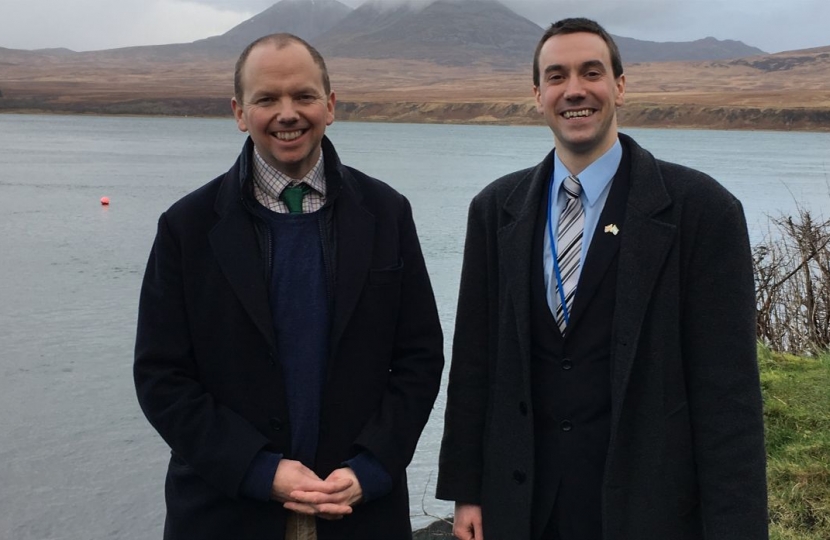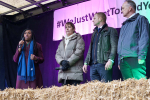
Poor mobile phone coverage will be a thing of the past as the UK Government champions a £1 billion deal with the mobile phone industry to banish rural not-spots.
The move will bring 4G coverage to 95 per cent of the UK by 2025 and be a huge boost for consumers. More people in rural areas will benefit from the speed and efficiency of services on the go - from booking travel, shopping online or speaking to friends and family.
Highlands and Islands MSP Donald Cameron has hailed news that an extra £1bn is to be spent on improving the mobile phone network as fantastic news for his constituents.
The Scottish Conservative MSP said: “I am delighted that the UK Government is backing this deal for a Shared Rural Network with the mobile phone operators.
“This means that £1bn will be spent across the UK, but with rural areas like Argyll and Bute gaining the lion’s share.
“This is fantastic news for local people who have for years been frustrated by poor coverage and provides them with real grounds for hope that things will improve.”
Councillor Alastair Redman (Kintyre and the Islands ward) added: “Poor coverage has long been a challenge for people here trying to run businesses or, indeed, just run their lives.
“Hopefully this announcement will unlock investment and help to sustain and grow the local economy.”
This would be a world-first deal with EE, O2, Three and Vodafone investing in a network of new and existing phone masts they would all share. Consumers will be able to rely on their own provider’s network to use their mobile phones wherever they are.
It is part of the Prime Minister’s plan to level up the country with world-class digital infrastructure across the country to make sure homes and businesses are better connected.
Digital Secretary Nicky Morgan said: “We are determined to make sure no part of the country is left behind when it comes to mobile connectivity. We are closing in on a deal with the mobile network operators so those living in rural areas will be able to get the fast and reliable mobile coverage they need and deserve."
The deal would see all four operators come together to create a new organisation to deliver the Shared Rural Network, in what would be an innovative and unique solution to the persistent problem of poor mobile coverage in the countryside. It would get the maximum use out of existing and new phone masts by allowing all four operators to host equipment on them.
Under the proposal, the four operators will invest £530 million to open up and share existing masts and infrastructure to close almost all partial not-spots - areas where there is currently only coverage from at least one but not all operators. It would also mean additional mobile coverage for 280,000 premises and 16,000 kilometres of roads.
If the operators agree to meet these ambitions on partial not spots, the Digital Secretary Nicky Morgan has been clear government will commit up to £500 million of investment to go even further to eliminate total not-spots - those hard-to-reach areas where there is currently no coverage from any operator.
Nick Jeffery, CEO of Vodafone UK, said: “There is no other scheme like this in the world. It will spell an end to annoying mobile ‘not spots’ for hundreds of thousands of people living, working and travelling in the more remote parts of the UK. By working together, we will deliver better coverage while offering more choice for consumers and businesses using far fewer masts.”
Mark Evans, CEO of Telefonica UK (O2), said: “These proposals represent a step-change in the way that mobile coverage is delivered. They are the most ambitious solution, of all proposals on the table and will ensure that customers across all corners of the UK can access a good connection. By providing a much-needed boost to rural communities, the Shared Rural Network represents a vital step in bridging the digital divide.”
“Mobile has become so much more than the phone in your hand; it’s the glue that powers the UK’s economy and will be a fundamental component of our national success in the years to come.”
David Dyson, CEO of Three UK, said: “We welcome the Shared Rural Network. It is the best way to enhance mobile connectivity for the 9.3 million living in the UK’s countryside: it brings mobile coverage to more places in the UK and it gives people in rural areas a similar choice as those living in towns and cities.”
Marc Allera, CEO of BT’s Consumer division, said: “While EE already has the UK’s largest 4G network, we’re always looking at new ways to efficiently deliver more 4G to areas that are hardest to reach.


